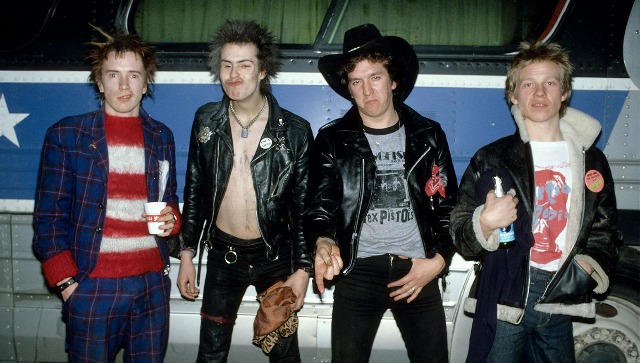In #TheMusicThatMadeUs, senior journalist Lakshmi Govindrajan Javeri chronicles the impact that musicians and their art have on our lives, how they mould the industry by rewriting its rules and how they shape us into the people we become: their greatest legacies Among the various tributes to Queen Elizabeth II for her Platinum Jubilee last weekend was a song that was first released to time it with her Silver Jubilee and promptly banned in most of the United Kingdom. In a delicious sense of irony, Sex Pistols released a new video of their anti-anthem God Save The Queen that includes footage for their infamous cruise down the Thames to mark the monarch’s 25th anniversary on the throne.
The band is back in social conversations thanks to Danny Boyle’s recently released six-part drama mini-series on Hotstar, Pistol. Based on band member Steve Jones’ memoir Lonely Boy: Tales from a Sex Pistol, the series looks at how a bunch of teenagers from working-class families shook the British establishment, the complacent long-haired post-hippie rockstars of the 70s and the social norms—particularly deference to the Crown—of the time. They managed to shock and seduce Britain—and by extension the US and Europe—in equal measure. In a short span of time, despite not being the first on the scene, Sex Pistols went on to define the punk movement in music and in society with their scabrous songwriting, nihilistic attitude and exuding utter chaos in a world that was facing rising unemployment, apathetic political leaders and social isolation. With manic time signatures and feverish drumming, heavy guitaring and inflammatory lyrics, pogo dance replacing rock-style headbanging, Sex Pistols were the incomparable provocateurs that took punk mainstream. They were the rebels with a cause that seemed to be buried under spiky hair and coloured tresses, a medley of ripped t-shirts with incendiary messaging, piercings and chunky jewellery. To think that they were a social experiment of sorts for designer-artists Vivienne Westwood and Malcolm McLaren who were looking to further an elaborate fashion movement but subverting the sartorial expectations of the time. By disrupting the norm and creating “chaos”, Sex Pistols along with their fashion friends and the bands that looked up to them like The Clash, Buzzcocks, Siouxsie and the Banshees, created and publicised an attitude that questioned authority, challenged social tradition and above all, shocked with outrageous language and behaviour. Today that’s an average Ricky Gervais standup show but in the 70s, this spelt pandemonium. The band comprising vocalist John Lydon (stage name “Johnny Rotten”), guitarist Steve Jones, drummer Paul Cook and bassist Glen Matlock, who was then replaced by Sid Vicious in early 1977, paved the way for generations of punk rockers. The common association is that punk tends to be able turmoil and disorder with actual musical talent being a lesser priority couldn’t be farther from the truth. Sure, since their formation in 1975 to their collapse in January 1978, the band’s musicality evolved and helped them become a tighter, more sonically cohesive outfit, the members were acutely aware of the shortcomings of the band’s enfant terrible Vicious in the bass department. A self-confessed “ultimate Sex Pistols fan”, Vicious was that archetype of disturbed youth trying to find his voice in a stifling society through shock and awe. With bare minimum contribution in the only album released by the band Never Mind the Bollocks, Here’s the Sex Pistols, Vicious’ perennial state of being on a bender cost him his life and, in a sense, put paid to the nascent band’s fate. Even then, the album was so path-breaking in its time that it continues to be considered the ultimate punk rock record to this day. With songs like Anarchy in the UK, Bodies, and God Save the Queen, Sex Pistols achieved what they set out to do: grab the attention of the public and the authorities, cock a snook at them and unsettle social order with their music, their attitude and their media presence. Until that point, the band had had a cult following thanks to Anarchy in the UK serving as a clarion call for a disgruntled generation. Rotten’s scornful vocals and Jones’ torrential guitar-playing positioned the song and the band as a torchbearer of punk politics, bringing in a new era of expression through the arts. It took a Freddie Mercury dentist appointment for the band (who was then managed by EMI along with Queen) for Sex Pistols to be the last-minute replacement in Bill Grundy’s Today show. Along with a contingent of punk musicians who frequented the King’s Road stretch, the band appeared on national television in a obscenity-laden interview with Grundy that shook the otherwise etiquette-worshipping Brit. By following this up a few months later with their single God Save the Queen, Sex Pistols announced their presence decisively and derisively. With avant-garde graphic design accompanying their album, EPs and merchandise, Sex Pistols became so much more than the music even though they continued to hone their prowess over instrumentation, vocalisation and song writing. Beyond their inner coterie that comprised The Clash, Siouxsie and the Banshees, the Adverts, and Subway Sect, the Pistols are said to have inspired the likes of Guns N’ Roses, Green Day, Nirvana, Oasis, Jesus and Mary Chain, NOFX, and The Stone Roses. As one of the brightest stars to have crashed and burned, Sex Pistols continue to inspire generations of musicians (not just punk) to not settle until they find the expression that they seek. Senior journalist Lakshmi Govindrajan Javeri has spent a good part of two decades chronicling the arts, culture and lifestyles. Read all the Latest News , Trending News , Cricket News , Bollywood News , India News and Entertainment News here. Follow us on Facebook, Twitter and Instagram.


)
)
)
)
)
)
)
)
)



